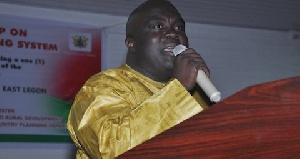…as it fails to release their 2% share of Common Fund
The government has failed to release the two per cent share of the District Assembly Common Fund (DACF) for the third quarter of 2013 to Persons with Disability (PWDs), though the Metropolitan, Municipal and District Assemblies (MMDAs) across the country have received their allocations, Mr. Yaw Owusu Debrah, President of the Ghana Federation of the Disabled (GFD) has disclosed.
The government's inaction has resulted in compounding the challenges of PWDs, particularly students who depend on that financial support for the payment of school fees and purchase of books, among other things.
“The government has released the Common Fund up to the third quarter of last year. When we [GFD] approached the Administrator of Common Fund to know the status of the 2%, he told us that what he received and apportioned, the 2% was not part of it,” Mr Debrah claimed.
He appealed to the government to as a matter of urgency, ensure timely releases of funds to the disability accounts to enable the beneficiaries to pay their fees.
Mr. Debrah made these disclosures in an interview with Public Agenda on the sidelines of a national stakeholder's dialogue organised by SEND-Ghana in Accra last Wednesday. The meeting discussed emerging issues arising out of SEND-Ghana's monitoring of allocation of the two per cent share of the DACF to PWDs.
It also discussed the findings and sought stakeholders 'commitments to address identified problems at the national level. The meeting brought together stakeholders such as policy makers, researchers, civil society groups and the media.
In an address read for him, the Minister for Local Government and Rural Development, Hon. Julius Debrah, pledged government's commitment to implementing policies and programmes geared towards improving the quality of lives of Ghanaians, especially the poor and vulnerable.
Mr Debrah indicated that government recognised the complementary role of Civil Society Organisations in governance and would continue to provide the enabling environment for engagement between government and civil society at all levels. The Minister commended SEND-Ghana for its contribution to policy discourse over the years.
In a welcome address, the Chief Executive Officer of SEND-West Africa, Mr Siapha Kamara, disclosed that for the past 15 years, the organisation had been using the participatory and evaluation framework to assess various national policies that improved the plight of PWDs.
He said these included policy education, which involve raising awareness on the activities and plans of government for the disabled community, and monitoring and evaluation, consisting of assessing the impact of government policies and programmes amongst PWDs; they also involved advocacy, which focuses on ensuring government's commitment to policies and programmes aimed at improving the lives of PWDs.
A research, which was conducted by SEND-Ghana, and launched recently in Accra, revealed the that Districts Assemblies take advantage of the absence of structures to borrow from the disability accounts and refuse to pay back.
The study indicated; “Contrary to the guidelines, there are no systems in place to prevent District Assemblies from borrowing from the accounts. This has resulted in situations where Assemblies continue to borrow money from accounts. Almost 60% of Co-ordinating Directors confirmed that the Assemblies sometimes borrow from the disability accounts.”
The research also revealed widespread violations of the guideline by the 15 District Assemblies reviewed. Further, the study unearthed that the District Assemblies hardly communicated the release of Funds and the amounts involved to the Districts Fund Management Committees (DFMCs).
It said almost 70% of DFMCs interviewed indicated that they did not receive official notification from the assemblies regarding releases of funds into the disability accounts.
It thus recommended that MMDAs should always furnish the DFMCs with information on disbursements. The MMDAs, the report said, should also ensure that the disability account is audited periodically in order to reveal the compliance or otherwise with the required guidelines. “The National Council for Persons with Disability should ensure that they have representatives in all the DFMCs. In addition, they should ensure timely and usable information flow from the national to the districts levels. They should also ensure that PWDs have enough information on the fund. Such information must be simple, timely and usable,” it added.
The DACF was created under Article 252 of the 1992 Constitution to cater for the development needs of the District Assemblies. The Act mandates government and the District Assemblies to set aside 2% of the DACF for PWDs.
General News of Tuesday, 15 July 2014
Source: Public Agenda

















